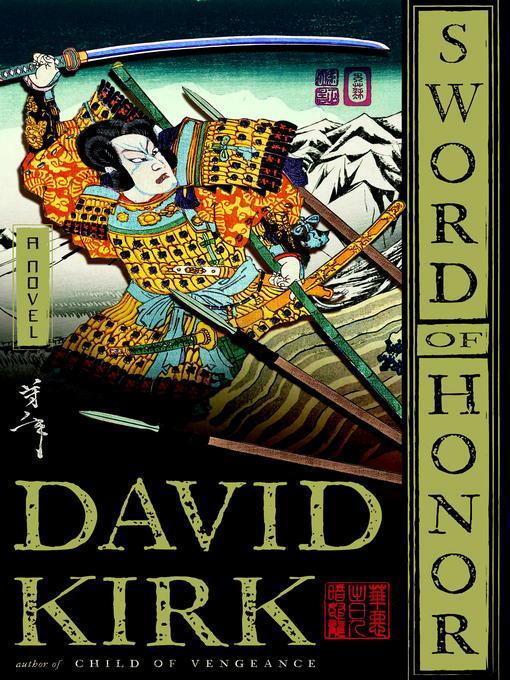
Sword of Honor
Musashi Miyamoto Series, Book 2
کتاب های مرتبط
- اطلاعات
- نقد و بررسی
- دیدگاه کاربران
نقد و بررسی

Starred review from September 1, 2015
In this historical novel set in early-17th-century Japan, a samurai is guided by the ruling passions of pride, honor, and shame. The book-a sequel to Kirk's Child of Vengeance (2013)-starts with the aftermath of the Battle of Sekigahara, where a young and talented samurai has been sickened by the slaughter of countless fellow warriors. He renames himself Musashi Miyamoto, rejects the ritual of seppuku, declares himself a "masterless" samurai, and begins life as a fugitive. He becomes, in fact, something of a 21st-century heroic figure, calling into question "the Way of the Sword," the samurai code to which men owe their allegiance and devote their lives with unquestioning obedience. By the terms of the Way, Miyamoto has dishonored himself, and to redress this wrong, a fellow samurai, Nagayoshi Akiyama, is sent after him with one single-minded task-to kill him. Miyamoto is proud of his outlaw status and willingly lets himself be found, leading to an epic confrontation between the two expert swordsmen. Miyamoto wounds Akiyama but doesn't kill him and even nurses him back to health. Together, they travel the countryside, picking up a companion along the way, a blind woman whom Miyamoto begins to find himself attracted to. They make their way to Kyoto, where Miyamoto dispatches a cadre of samurai sent to take his life. In fact, these search-and-destroy missions give a rhythm to the book. Kirk doesn't shrink from the violence these warriors mete out to each other and even finds both poetic and excruciatingly exact ways to describe the many duels that take place. Kirk's vigorous and robust prose complements the action to make rousing historical and philosophical statements.
COPYRIGHT(2015) Kirkus Reviews, ALL RIGHTS RESERVED.

Starred review from August 1, 2015
After having his helmeted head split open, samurai Musashi Miyamoto walks away from a battle, knowing his lord will be defeated. It is an unthinkable act of dishonor, but it gives rise to questions about his own motives and the tenets of the 1,000-year-old samurai tradition that is powerfully ingrained in the world around him. Can one man's struggle to change a feudal culture actually amount to anything of noble value? Or will he simply become another gifted swordsman and pawn of the current clever leaders and potent magistrates? How can Musashi survive, let alone his ideals? VERDICT This second volume (after Child of Vengeance) of Kirk's saga about Japan's greatest warrior is a success. The dialog, characters, and surrounding events and landscapes feel so authentic, it's easy to forget one is reading a novel. Historical fiction fans will relish this offering, but anyone who appreciates a solid, action-packed, thoughtful reading experience will find this novel very satisfying.--Russell Miller, Prescott P.L., AZ
Copyright 2015 Library Journal, LLC Used with permission.

Starred review from October 15, 2015
Musashi Miyamoto is a historical figure from seventeenth-century Japan whose sparse biography is the taking-off point for Kirk's rich novel. Musashi is a young samurai who refuses to commit seppuku after the fateful Battle of Sekigahara and launches a one-man rebellion against the tyranny of the Way, which demands such sacrifices. He lives in the wild with two war refugeesthe lovely, blind Ameku and the girl Yaealong with his would-be assassin, whom Musashi is now nursing back to health. Emerging only to buy food or wreak vengeance on perpetrators of injustice, Musashi finally sets his sights on Kyoto, where he intends to confront the powerful Yoshioka sword school that sought his death. There are lots of elements that make this novel an extraordinary read: the throat-gripping set pieces, beautiful imagery, crafty politics, and themes of ego, power, and individualism. Most of all, it is how this tale of a masterless samurai is rendered in language that feels like it's from a different time and placenot because of archaisms or cheap tricks but because it is slow without being tedious, and it emerges from a wholly foreign worldview without being incomprehensible to the modern mind. Musashi is an unforgettable character, and this novel should make Kirk a leading name in historical fiction.(Reprinted with permission of Booklist, copyright 2015, American Library Association.)

























دیدگاه کاربران